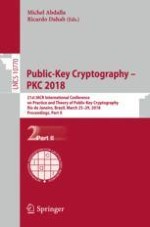2018 | OriginalPaper | Buchkapitel
Learning with Errors and Extrapolated Dihedral Cosets
verfasst von : Zvika Brakerski, Elena Kirshanova, Damien Stehlé, Weiqiang Wen
Erschienen in: Public-Key Cryptography – PKC 2018
Aktivieren Sie unsere intelligente Suche, um passende Fachinhalte oder Patente zu finden.
Wählen Sie Textabschnitte aus um mit Künstlicher Intelligenz passenden Patente zu finden. powered by
Markieren Sie Textabschnitte, um KI-gestützt weitere passende Inhalte zu finden. powered by
